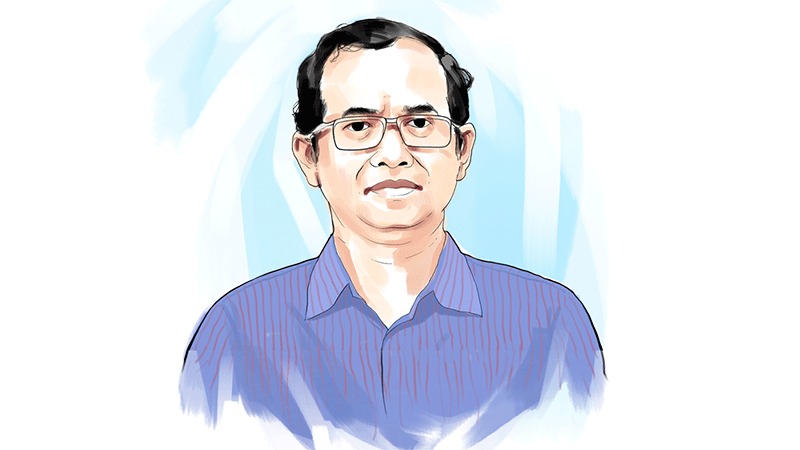Originally posted in The Business Standard on 15 March 2023
Poor nutrition, less productivity and stagnated growth
The Business Standard spoke to economists – Dr Khondaker Golam Moazzem, Research Director at Centre for Policy Dialogue – for more insights into the lives of the citizens beyond the data.

Mizan works at a mobile phone shop in the capital’s Khilgaon Taltola market. He is currently dealing with two crises that threaten his moderately stable life.
His salary has remained almost the same for several years now. His employer gave him a small raise in the recent past, amounting to only a few bucks, which is not even worthy of mention. Mizan can no longer maintain his family’s expenses without borrowing from others.
But the real crisis is he cannot even push his employer for a raise because, as Mizan knows, “business is dull.” And that is perpetuating the vicious cycle of borrowing.
“We used to have beef once every month. Now I don’t remember when I had it last. The price of chicken has also doubled,” Mizan said. “We are mostly vegetarian now.”
If you had a chat with a salesperson, beyond haggling for lower prices, chances are you will come across a lot of people like Mizan in Bangladesh. As the cash-crunched economy struggles, skyrocketing inflation – which Bangladesh Bureau of Statistics (BBS) claims is 8.78% at present, while economists say the rate is much higher – has put massive pressure on citizens.
In the grand scheme of things, the uptick in food prices inevitably means some basic food becomes unaffordable for particular socioeconomic groups, which results in a lack of nutrition. This is a growing challenge, which in effect, may result in less productivity in workers, and hence stagnate overall national progress. And, of course, this continuously deteriorates living standards.
The latest BBS data shed light on a daunting reality – the wage growth rate has been slow while the inflation rate surged nonstop for the last 13 months.
Against an 8.78% inflation, wage growth is 7.11% at the moment, according to the BBS.
Dr Kazi Iqbal, a senior research fellow at the Bangladesh Institute of Development Studies (BIDS) told TBS that this indicates, “Wage earners are worse off. Inflation is eating away their purchasing power.” We reached out to economists – Mustafa Kamal Mujeri, Executive Director at the Institute for Inclusive Finance and Development (InM) who was also the Director General of BIDS, and Dr Khondaker Golam Moazzem, Research Director at Centre for Policy Dialogue – for more insights on the impacts on the lives of the citizens that go beyond the data.
‘Declare special increments for fixed-income people’

What does the latest BBS data indicate about the lives of wage earners in Bangladesh?
Firstly, the real income growth of workers is slower than before. And the continuation of this trend means that real income’s capacity to meet basic necessities is reducing. In the initial phase, a worker’s disposable income reduces because of high inflation and the slow rise of real income, and it shrinks his/her savings capacity.
As it continues, their saving opportunities dry up. When a situation like this persists, s/he has to change one’s lifestyle in different ways, such as lifestyle expenses, for survival.
Initially, the wage earners may try to survive on loans. But eventually, it may lead them to reduce their food intake and compromise on nutrition (or costlier food). For example, shifting to carbohydrates from protein – which affects one’s food and nutrition security.
If the trend continues like this, there is a chance a group of people will be pushed below the poverty line.
Who do you think is more vulnerable to this wage rate-inflation gap?
It is obvious that these are the people who live just above or below the poverty line.
We can say the day labourers – those who don’t have a fixed income, like rickshaw pullers, van drivers, grocery store employees, etc. The main challenge is for them.
However, another section of sufferers is people with low monthly income. Those who are employed on monthly salaries, but their salary is very limited. For example, a hotel waiter, a low-grade employee in the private sector, or a low-grade government official. Inflation rises but their salaries don’t.
They are the most affected part of the population.
What is the way out of this crisis?
At present, chances of an immediate way out are low.
Rather we are now inside the cycle of high inflation. It is not easy to get out of it. We have both global challenges and internal crises. We should now focus on reducing the impact of high inflation on living standards. What we can do is the expansion of the government’s social safety net. It is happening in the cities but not in the villages. We can increase food distribution in the villages.
Secondly, the government can announce a special increment for fixed-income people, maybe temporarily, in both government and private sectors, outside the annual increments, so that they can handle the extra expenses.
This can be implemented by targeting the coming budget. Also, the coming budget can increase the tax-free earning limits.
Besides, the government can request private sectors not to lay off workers. In a situation like this, what happens is since people’s income drops, it limits their expenses as well. As a result, the local industries’ production demand also falls. What they do in a situation like this is lay off workers. The labour and trade ministries should monitor that no industry starts laying off workers.
In the long term, we will also have to think about unemployment insurance. Such a mechanism will be required in the long run.

